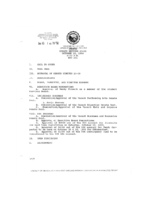Search the Special Collections and Archives Portal
Search Results

Meeting minutes for Consolidated Student Senate, University of Nevada, Las Vegas, September 20, 1983
Date
Archival Collection
Description
Text

Pair A Dice Mobile Home Park Neon Survey document, September 12, 2017
Date
Archival Collection
Description
Site address: 2067 N Las Vegas Blvd
Sign owner: Peyman Masachi and Pair A Dice Estates LLC
Sign details: Originally construction was in 1956 for a Manufactured Homes park. This location offers 137 spaces for mobile homes and have 42 permanent parked homes.
Sign condition: 3.5- paint has faded drastically
Sign form: Pylon
Sign-specific description: This pylon has 2 plastic back lit red dice on the top of it with the one on top with the number 5 and the lower one reads 2 to make the lucky number 7. To the non-road side of this double sided sign is a yellow circle plastic back lit sign that has painted black letters stating "Pair A Dice". Below this is an orange triangle shape that has channeled neon white steel letters near the top of it stating "Trailer Park" in a block type font that illuminate white at night. Below these letters are a white plastic back lit sign stating "R.V.'s Welcome" with their phone number posted underneath. Below is another plastic back lit sign that is yellow with a black font stating "Senior Park". Below this is a skeletal neon arrow that points to their driveway that illuminates yellow at night.
Sign - type of display: Neon and plastic back lit signs
Sign - media: Steel and plastic
Sign - non-neon treatments: Plastic Back lit portions
Sign animation: Chasing, flashing, oscillating
Notes: The logo cabinets which adorn the entrances on the elevated walkways: The letters start with both rows of text in the off position. The top row flashes on, while the bottom row is dark then the bottom row illuminates, as the top row goes dark. Once the top row flashes off it flashes back on so that both rows of text are briefly illuminated simultaneously before they both go dark and the sequence stars over again. While this is going on the incandescent bulbs which line all of the raceways are chasing each other from left to right on the horizontal planes, while the arched sections chase each other downward. The triangular peaks which radiate around the top of the logo sign, flash on and off in a sequence which chase each other downward. First the top center peak flashes on, then the next sequential triangular channel on both sides illuminate simultaneously, flash off, then the next two in the series illuminate. The resultant effect is a chasing pattern starting from the top. The sister animation is located on almost the exact same design on the porte cochere. I would think the previous smaller sign would be based on the larger porte cochere. The other variance besides obvious size difference is the that the channel letters are filled with incandescent bulbs instead of neon. The animation is a bit simpler as well. The incandescent bulbs oscillate continuously while the triangular pan channels which create the radiating crown, animate. The neon in the channels chase each other as described in the smaller walk way version, while the text continues until the entire text flashes off, then on, off, then begin to animate once again. All of the bulbs, which line the raceways of the exterior edge of the porte cochere, as well as the encrustation of bulbs on the brass bull nose portion, animate in rapid succession. All the raceway bulbs chase each other while the bulbs on the brass portion continually oscillate. Animation continues on the east face of the building with the entrances first. The principle for these two signs is oscillation and chasing. All bulbs on the underside of the entrance, as well as in the logo, oscillate rapidly. All bulbs on the raceways chase each other. Further on the surface of the building as well, the Pepsi cola wall sign is found displaying a very unique form of animation, seen here on the strip. The signage for the Pepsi ad is located on the eastern wall. (Detailed in specific description) The Incandescent bulbs which fill the inside of the text that spells Pepsi, chase each other from left to right, leaving all the bulbs in its path illuminated, as if writing out the word Pepsi. The neon bars located within the tilted bottle of Pepsi are illuminated, and chase each other downward, leaving the bars it its path dark. As this sequence in taking place, the waving tubes of neon illuminate, flashed subtly making the neon appear as soda pouring out of the bottle. As the tubing flows then the vertical neon bars in the cup illuminate one at a time making the cup appear as if it is filling up. The text above each of the painted fires head, flashes back and forth as if talking to each other as well. ESPN ZONE animation: The letters in the vertical blade portion of the ESPN Zone illuminate one at a time, starting from the top. Once the entire phrase is lit, in flashes off then on then off, before restating. The orange and red neon tubing which resides inside the pan channels that represent flames flash on and off in a relaxed manner as if to animate the flickering of the flames. The small incandescent bulbs on the black portions above the main matrix reader board flash on and off subtly.
Sign environment: This location is in North Las Vegas along Las Vegas Blvd. It is north of Jerry's Nugget by about a mile.
Sign manufacturer: There is a marking for "BMS" on this sign which is a sign manufacturer in Minneapolis, Minnesota but could not get in contact with anyone to see if this is the correct manufacturer/maintainer or if it had a different meaning.
Sign - date of installation: Has been up since at least 2007 but does look a lot older than that
Sign - thematic influences: The triangle in this sign does have a mid-century modern theme (50's/60's) to it with curved geometric shapes.
Sign - artistic significance: The theme of Pair A- Dice plays perfectly with the theme of Vegas since for many table dice games you need a pair of dice. Though you are also in paradise here in Vegas particularly since the incorporated area of Vegas which we all know as the strip is technically the city of "Paradise". Also the Pair O' Dice was the name of one of the first casino's down on the strip when gambling was re-legalized in the state of Nevada in 1931.
Survey - research locations: Assessor's Page, Loop Net- Information on what the property offers http://www.loopnet.com/Listing/18840376/2067-N-Las-Vegas-Boulevard-Las-Vegas-NV/ , _Las Vegas Sun article https://lasvegassun.com/news/2011/mar/01/2-southern-nevada-contractors-file-bankruptcy/_, google maps satellite and roadside view
Survey - research notes: With the BMS sticker on this sign, it could be a sign company but the only one found online was in Minnesota. Unless if there was a BMS in Las Vegas but was bought out by a bigger sign company.
Survey - other remarks: The Pair A Dice LLC company went bankrupt in 2011 which this Las Vegas Sun article discusses https://lasvegassun.com/news/2011/mar/01/2-southern-nevada-contractors-file-bankruptcy/
Surveyor: Emily Fellmer
Survey - date completed: 2017-09-12
Sign keywords: Neon; Plastic; Backlit; Steel; Roadside
Text

Meeting minutes for Consolidated Student Senate University of Nevada, Las Vegas, October 18, 1990
Date
Archival Collection
Description
Text

Meeting minutes for Consolidated Student Senate University of Nevada, Las Vegas, February 4, 2002
Date
Archival Collection
Description
Text

Meeting minutes for Consolidated Student Senate, University of Nevada, Las Vegas, March 08, 1983
Date
Archival Collection
Description
Text
Mesquite Club Records
Identifier
Abstract
The Mesquite Club Records (1911-2016) contain the organizational files of the Mesquite Club, the oldest women's service club in Las Vegas, Nevada. Materials include meeting agendas and minutes, correspondence, committee reports, newsletters, scrapbooks, and photographic prints and negatives. The records document the club's administrative structure, community service projects, social events, and relationship with the General Federation of Women's Clubs (GFWC).
Archival Collection

Transcript of interview with Betty Bunch by Joyce Marshall, January 9, 1996, February 7, 1996, & February 13, 2002
Date
Archival Collection
Description
Betty [Rosenthal] Bunch began dancing as a child. By the time she was nine years old she decided she would have a dancing career. At 18 years she began to work in stock theatre productions. Within a short time, she had joined the Moro-Landis dancers. She landed her first job in Las Vegas in 1956 at the Sahara Hotel as part of the opening line for Donald O'Connor. Following the Sahara, she worked as a dancer at the Riveria, and then returned to the Moulin Rouge in Hollywood. In 1961 while vacationing in Las Vegas, she landed a job dancing at the Dunes. She continued to dance, sing and do comedy until after the birth of her second child. At that time, she retired from the Las Vegas showroom, but not from show business. Her involvement in both film and stage has remained rich and varied. This interview focuses on the time Betty spent performing on the Las Vegas strip, including her long involvement with the acclaimed afternoon show Bottoms Up. The interview provides information on workin
Text

Transcript of interview with Mary Ellen Campbell by Ronald Robinson, March 6, 1977
Date
Description
On March 6, 1977, Ronald Robinson interviewed Mary Ellen Campbell (born 1886 in Panaca, Nevada) about her life in Nevada. Campbell first talks about her parents’ move to the United States from England and her own life growing up in Panaca. She also talks about living in Pioche and the conditions of living in these two small Nevada towns. Also present during the interview is Mary’s grandson, Allen Campbell, who sometimes asks a few questions as well.
Text

Transcript of interview with Carl Ciliax by Gary Wood, March 8, 1980
Date
Archival Collection
Description
On March 8, 1980, Gary Wood interviewed Carl Ciliax (born 1941 in Las Vegas, Nevada) about his experiences living in Nevada. Ciliax first describes his family history, his early interests in wildlife, and his background and education in artwork. Ciliax then discusses his early experiences in hunting and his eventual interest in conservationism and preservation, including his involvement with organizations that sought the protection of desert bighorn sheep and the protection of wildlife in general. The two talk more about wildlife, the early development of Las Vegas, and the effects of the atomic testing. The interview concludes with Ciliax’s recollection of recreational activities and some of his thoughts on conservationism.
Text

